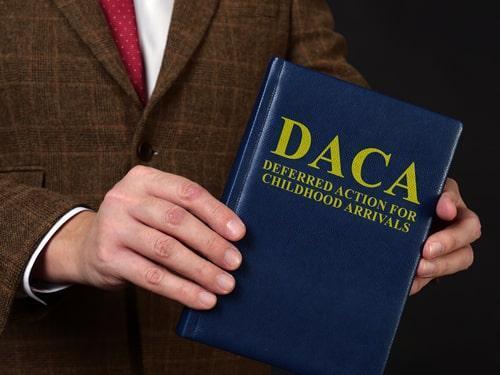
Free Consultations 844-IMIGRAR
What Is the Current Status of the DACA Program in the United States?
 People who originally came to the United States as children, who are often referred to as Dreamers, face some unique immigration issues. In many cases, these children have lived in the U.S. for most of their lives, and they may not speak languages other than English or be familiar with the culture and history of their home countries. Because these immigrants were not in control of how they entered the United States, many people believe that it would be unfair and ethical to perform deportations, forcing them to leave the only homes they have known and placing them in an uncertain or dangerous situation in another country. However, at the same time, they may not qualify for Green Cards that would allow them to maintain a legal status in the United States.
People who originally came to the United States as children, who are often referred to as Dreamers, face some unique immigration issues. In many cases, these children have lived in the U.S. for most of their lives, and they may not speak languages other than English or be familiar with the culture and history of their home countries. Because these immigrants were not in control of how they entered the United States, many people believe that it would be unfair and ethical to perform deportations, forcing them to leave the only homes they have known and placing them in an uncertain or dangerous situation in another country. However, at the same time, they may not qualify for Green Cards that would allow them to maintain a legal status in the United States.
The Deferred Action for Childhood Arrivals (DACA) program was created to address this issue. This program was put in place by the administration of President Barack Obama in 2012, and it was meant to be a temporary solution until new laws could be passed that would provide Dreamers with a pathway to legal residence in the United States and eventually U.S. citizenship.
Under the DACA program, immigrants who met certain criteria have been able to apply for relief, and if they were accepted into the program, any deportation actions against them would be deferred for two years. They could also apply for work authorization that would allow them to maintain employment and support themselves while living in the United States. Those who have received DACA protections can apply for renewals, and if approved, protections may be extended for an additional two years.
The Future of the DACA Program Remains in Doubt
Unfortunately, Congress has yet to pass immigration reform laws that address Dreamers and provide them with protections against deportation or a pathway to legal residence and citizenship. At the same time, several states have taken actions meant to limit illegal immigration to the United States and remove protections that apply to certain immigrants. The state of Texas has filed a lawsuit to end the DACA program, and on July 16, 2021, a federal judge issued a ruling finding that the program is unlawful.
Under the judge's ruling, new DACA protections cannot be issued for people who are applying to the program. While first-time DACA applications can be accepted by U.S. Citizenship and Immigration Services (USCIS), these applications cannot be processed. However, renewal applications are still being accepted and processed, so those who had previously been granted DACA protections may be able to extend these protections, as long as they file renewal applications within the appropriate time frames.
The case is still ongoing, and a final decision on the status of the DACA program has not yet been made. The Department of Homeland Security issued a new DACA rule on October 31, 2022 that kept the provisions of the original DACA program in place. However, until a final decision is made by the courts, new DACA applications cannot be processed.
What Are the Criteria for DACA?
When the DACA program was put in place in 2012, it allowed people to apply for protections if they met the following requirements:
-
They were younger than 31 years old as of June 15, 2012.
-
They originally entered the United States before reaching the age of 16.
-
They resided in the U.S. without interruption from June 15, 2007 until the date of their initial application for DACA.
-
They were located in the United States on June 15, 2012 and when they filed a DACA application.
-
They did not have a legal immigration status as of June 15, 2012 and at the time they filed a DACA application.
-
They were enrolled in school at the time of filing a DACA application or had previously received a high school diploma or GED. If a person is a veteran of the U.S. military who was honorably discharged, this requirement may be waived.
-
They have not been convicted of any felony offenses, significant misdemeanors, or three minor misdemeanors.
Contact Our United States Immigration Attorneys
While the ability to use the DACA program has been limited, other options for immigration may be available. At Immigrate Lawyer, our U.S. immigration attorneys can assist with applications for family visas, Green Cards, and more. To schedule a free consultation and learn more about our services, contact us at 844-464-4727.
Sources:
https://www.uscis.gov/DACA
https://www.nilc.org/issues/daca/






